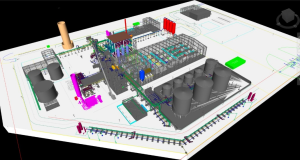The Landfill Consequences and Reduction Strategies
Landfill reliance becomes increasingly dangerous as municipal solid waste is projected to soar from 2.1 billion to 3.8 billion tonnes by 2050, with plastic waste being a particular concern as it can take up to 1,000 years to decompose.
While landfills seem convenient, they create serious environmental and health risks through emissions and contamination. The path forward requires prioritising landfill reduction strategies and investment in advanced waste treatment technologies that provide sustainable alternatives to landfill disposal.
In this blog, we will examine the consequences of landfill pollution and a range of sustainable waste management practices, from waste-to-energy solutions to sustainable waste disposal solutions.
The Negative Consequences of Landfills
The impact of landfills extends far beyond their physical boundaries, with landfill methane emissions being particularly concerning. Landfills are one of the largest sources of methane emissions globally, producing this greenhouse gas that is 25 times more potent than CO2 at trapping heat in the atmosphere.
Here are the complex environmental challenges that landfills present:
- Methane and Greenhouse Gas Emissions: Landfills play a major role in climate change by producing methane gas. When organic waste decomposes without oxygen, it releases methane – a greenhouse gas more potent than CO2. This significantly contributes to the environmental impact of landfills, accelerating climate change.
- Contamination of Water and Soil: Rainwater passing through landfill waste creates leachate, a toxic liquid that can contaminate nearby water sources and soil. This pollution depletes oxygen in water bodies and damages soil fertility, harming aquatic plant life.
- Land Impact and Habitat Loss: Landfills consume vast tracts of land, with the average U.S. landfill size being 600 acres. This extensive land conversion leads to habitat destruction and fragmentation, severely disrupting natural ecosystems and destroying wildlife habitats.
- Environmental Impacts: Landfills attract large populations of rodents and other pests, impacting local communities and businesses. Coastal landfills pose additional risks, as they are vulnerable to flooding and erosion, which can result in waste being released into the ocean and threatening marine life.
- Toxic Chemical Pollution: Landfill leachate often contains harmful chemicals, including PFAS. These chemicals are extremely persistent in the environment and have been linked to various health problems.
Implementing sustainable waste management solutions is essential to addressing these challenges. The recycling industry must focus on more effective waste management practices that reduce landfill use, such as renewable energy solutions.
Sustainable Waste Management Practices to Reduce Landfill Use
The growing amount of waste and greenhouse gas emissions from landfills necessitates a shift toward strategies for a sustainable future. Adopting alternative approaches to reduce landfill waste is also crucial for the circular economy to thrive in the long term.
Here’s a deeper look at key strategies for reducing landfill use:
1. Advanced Recycling Technologies
Modern recycling practices form the cornerstone of effective waste management. Through innovative processing techniques, waste materials are transformed into valuable resources, significantly reducing environmental impact and conserving raw materials.
However, the future of recycling extends far beyond traditional methods. Advanced technologies are emerging that promise to revolutionise how industries reclaim and reuse materials, pushing the boundaries of what’s recyclable and further minimising our reliance on landfills.
2. Waste-to-Energy Solutions
Waste-to-energy (WTE) technologies offer a compelling alternative to landfilling by converting non-recyclable waste materials into usable energy. WTE plants employ a variety of processes to generate electricity or heat from waste.
Waste-to-energy solutions can significantly reduce the volume of waste sent to landfill sites, conserve land resources, and provide a renewable energy source. Furthermore, modern Waste-to-energy plants incorporate advanced emission control systems to minimise air pollutants and environmental impacts.
3. Composting from Waste to Black Gold
Composting benefits include transforming food scraps and yard waste into nutrient-rich soil, diverting organic materials from landfills to reduce methane emissions and toxic leachate, and creating natural fertiliser that improves soil health while decreasing reliance on synthetic alternatives.
4. Biochar Production: A Powerful Complement to Composting
Biochar offers a powerful solution as one of the key strategies to reduce waste in landfills. This charcoal-like substance, produced from the pyrolysis of biomass (heating organic matter in the absence of oxygen), enhances traditional composting methods.
While composting focuses on the rapid decomposition of organic matter, biochar production creates a stable form of carbon that can persist in the soil for centuries, providing sustainable long-term benefits for waste reduction.
Discover SynPet’s revolutionary technology that offers sustainable alternatives to landfills!
SynPet helps businesses and governments to reduce landfill reliance through innovative hazardous waste treatment and resource recovery.
5. Zero Waste Approach to Resource Management
The zero-waste philosophy extends beyond simply reducing waste; it represents a fundamental shift in how society views and manages resources. Zero-waste initiatives promote rethinking consumption patterns, prioritising reuse and repair, and ultimately aiming for a closed-loop system where waste is eliminated or transformed into valuable resources.

This involves embracing sustainable product design, supporting local and circular economies, and promoting responsible waste management practices throughout the entire product lifecycle. Adopting a zero-waste approach helps minimise environmental impact, conserve resources, and create a more sustainable future.
Reducing Landfill Impact with SynPet’s Recycling Technology
With Thermal Conversion Process (TCP™), a cutting-edge recycling technology designed to recycle various materials, including hazardous waste, SynPet directly reduces landfill dependency, paving the way for a sustainable, circular economy.
SynPet’s TCP™ transforms waste into high-quality products with three steps:
- Depolymerisation: Waste materials are exposed to water, heat, and pressure, separating organic from inorganic substances. Organic components are then processed further.
- Hydrolysis: Using a water gas shift reaction, contaminants are removed, and oxygen is stripped from hydrocarbon chains through decarboxylation, creating pure hydrocarbon molecules.
- Cracking: Thermal cracking at temperatures above 450°C shortens hydrocarbon chains, yielding high-value outputs like synthetic fuels.
What makes TCP™ truly revolutionary is its ability to handle unsorted waste directly, eliminating the need for costly and time-consuming processes of sorting, cleaning, or drying. This makes it a highly efficient and cost-effective solution for waste management.
By significantly reducing emissions from landfilled waste and converting it into valuable resources, SynPet’s TCP™ technology represents a major advancement toward environmental sustainability.
Discover SynPet’s innovative technology and take advantage of waste management!
Explore tailored solutions that reduce your environmental footprint while maximising resources, and transforming waste into valuable assets.






